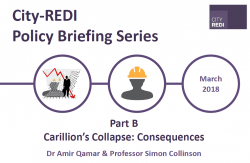Professor Simon Collinson discusses a recent study by City-REDI and the West Midland Combined Authority mapping the inflows of various kinds of public R&D investment into the region. R&D and the West Midlands The West Midlands attracts a significant amount of private sector R&D investment, about £398 per capita according to one study (Jones and … Continue reading “R&D Investment in Our City-Region: Local Potential for Future Inclusive Growth”
Tag: Simon Collinson
The Contribution of Universities to Inclusive Regional Growth
On the 18th – 20th of May, the Civic Universities Network will be holding its inaugural annual conference. Professor Simon Collinson will be hosting a conference panel session at the event looking at the contribution of universities to inclusive growth. In this blog, Professor Collinson outlines some of the challenges of evaluating and enhancing this … Continue reading “The Contribution of Universities to Inclusive Regional Growth”
Professor Simon Collinson Awarded Chartered ABS Fellowship
Professor Simon Collinson, Deputy Pro-Vice-Chancellor for Regional Engagement and Director of City-REDI at the University of Birmingham was awarded a Fellowship from the Chartered Association of Business Schools (CABS) at the CABS 2019 Annual Conference, in recognition of his outstanding contribution to the organisation’s mission over the course of several years. Professor Collinson was a … Continue reading “Professor Simon Collinson Awarded Chartered ABS Fellowship”
The Birmingham Economic Review 2018 – Ideas
The Birmingham Economic Review was produced in October 2018 by City-REDI, the Greater Birmingham Chambers of Commerce and the West Midlands Growth Company. The review highlights the current strengths and weakness of the Birmingham economy, as well as looking at the opportunities and threats that might impact upon it in the future. Over the next few weeks, we will be producing … Continue reading “The Birmingham Economic Review 2018 – Ideas”
Flexibility Differences between Lean and Agile Production in the West Midlands Automotive Supply Chain
The majority of studies which have investigated lean and agile production have explored each of these production concepts in silos, which is a growing trend in the recent literature. Given that a number of studies assert that flexibility is an essential factor for differentiating lean and agile production there is an important need to explore … Continue reading “Flexibility Differences between Lean and Agile Production in the West Midlands Automotive Supply Chain”
Metro-Mayors: Can they address UK Regional Inequality?
Professor Simon Collinson discusses the need to devolve power in the UK to address the economic imbalance between London and the South East and the rest of the UK. Metro Mayors can potentially be a powerful instrument to promote regional growth which is critical to the long-term social and political stability of the country. In … Continue reading “Metro-Mayors: Can they address UK Regional Inequality?”
City-REDI publications series: Professor Simon Collinson – MNE microfoundations and routines for building a legitimate and sustainable position in emerging markets
As part of a new blog series, we will be highlighting the excellent research produced by the City-REDI team since 2015, with the aim of creating an online searchable library. You can view this work by searching the blog with the relevant tag, either using the name of the author or the year of the publication. The … Continue reading “City-REDI publications series: Professor Simon Collinson – MNE microfoundations and routines for building a legitimate and sustainable position in emerging markets”
Part B: The Consequences of Carillion’s Collapse
Carillion, the second-largest construction firm in the UK, were proud of their commitment to support regional growth and small-scale suppliers. As part of this commitment, they directed 60% of project expenditure to local economies. Following the collapse of the firm, this positive multiplier effect became a significant, negative multiplier effect, particularly damaging to small-scale suppliers … Continue reading “Part B: The Consequences of Carillion’s Collapse”
Part A: The Causes of Carillion’s Collapse
Racing to secure bids over rival construction companies, Carillion, the second-largest construction firm in the UK, hit a financial tipping point, lost the backing of the banks and collapsed. Its aggressive growth strategy and the diversification of its business portfolio increased the complexity of its internal structure. Coupled with poor oversight of its day-to-day operations, … Continue reading “Part A: The Causes of Carillion’s Collapse”
Are business schools fit for the future?
The growth of business education over the past 60 years has been phenomenal, with more than 16,000 business schools operating worldwide, according to an AACSB estimate. Yet a growing range of challenges will mean that in 25 years’ time, many of our business schools will not exist, and none will exist in their current form. … Continue reading “Are business schools fit for the future?”










